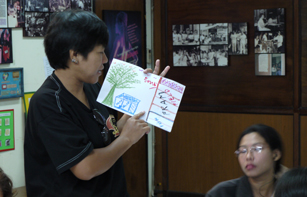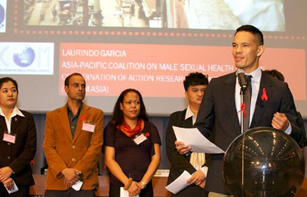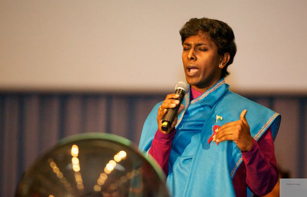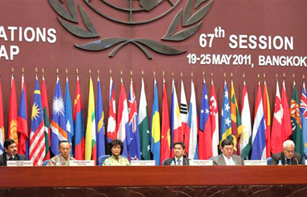
24-year old Ayu Oktariani from Indonesia who is living with HIV is part of the Youth LEAD network for key affected populations.
Credit: UNAIDS
When Palitha Wijebandara from Sri Lanka found out he had tested positive for HIV, he was shocked and confused. He had been tested as part of a company policy at his work, without his specific consent or proper counseling, and he did not understand the implications of his test result.
Palitha is one of many thousands of people in Asia and the Pacific who have faced the challenge of discovering their HIV status in their youth. At only 23 years old, he was alone. He did not know how to face his family. He feared discovery of his status and of the fact that he had been having relations with other men.
In Asia and the Pacific, evidence indicates that 95% of all new HIV infections in young people in the region are among young people from key affected populations—young people who buy and sell sex, young men who have sex with men, young transgender persons and adolescent drug users.
Specific data on young people at higher risk of HIV in the region is sparse. But estimates that do exist give cause for concern. In some Asian countries, three out of five female sex workers, and almost half of all men who have sex with men, are younger than 25 years. In the Lao People’s Democratic Republic, 82% of sex workers are in that age group. In Nepal, half of all people who inject drugs start injecting in their late adolescence, when they are between 15 and 21 years old. By the time someone has been injecting for a year, there is a 33% chance that they will have acquired HIV.
Multiple challenges
Despite high vulnerability to HIV infection, young people at higher risk find it difficult to obtain information on HIV, sterile injecting equipment, or other services such as HIV testing and support. Across Asia-Pacific, programmes focusing specifically on young people most at risk are often scarce.
“Prevention campaigns don’t reach out to young female sex workers as often we do not come out to access the information, and if we do, it doesn’t speak to us,” said Ms Fulmaya*, a young sex worker from Nepal.
“As a young gay man, some things are hard to say openly and you worry that if you say those things, people will discriminate against you. The first time I wanted to get an HIV test, I had no idea where to get it and I was too scared to go to the hospital,” said Xiao Chen*, 21, from China.
Stigma, the criminalization of certain behaviours and other legal hindrances mean that young people from key populations at higher risk are often difficult to reach. In many countries, taking an HIV test, going on HIV treatment, or using reproductive health or harm-reduction services requires the consent of a parent or guardian.
“I can’t get the free HIV test because I don’t want my mother to know what I’m doing and so I cannot provide the clinic with parental consent. All I want is to know my HIV status,” said Bugoi a transgender sex worker from the Philippines.
Many adolescents find sexually transmitted infection clinics and HIV clinics intimidating, and feel uncomfortable talking about personal issues with clinical staff who are much older than them, and who can be judgmental. Harm-reduction programmes for drug users generally focus on male adults, despite statistics that show some young drug users start injecting as early as 12 years old and the fact that young women also need services.
“I have heard of organizations that give out needles but many are far and they only target the boys,” explained Payal, an 18 year old woman from Nepawho uses drugs.
An often-expressed frustration of young people from key populations at higher risk in Asia is that they often feel they are robbed of the voice to describe, discuss and alter their realities.
“Young people have plenty to say, but their voices aren’t heard. I think if people paid more attention to HIV and strengthened the voice of the community a bit, more people would learn about HIV and understand the issues and what we need,” Xiao Chen* said.
Time to lead
Some significant action is being taken to bring the voice of young key affected populations to the foreground –organizations and networks of young people from key populations at higher risk are gradually becoming strengthened.
Sri Lankan Palitha Wijebandara, who discovered his status through an unauthorized HIV test, drew strength from his involvement in peer support and, recently, from his efforts to promote the rights of young people from key populations at risk through Youth LEAD. This Asia Pacific regional network set up in 2010 is helping develop youth leadership in key populations at higher risk to strengthen their involvement in community, national and regional programmes. Representatives from Youth LEAD and other youth at risk organizations are increasingly being able to take their place at the table in regional policy arenas and debates.
We need to be empowered and supported so that we can take ownership of AIDS. We are here to say please include us, listen to us, work with us and together we can achieve great things
24-year old Ayu Oktariani from Indonesia
From 6-8 February in Bangkok, Thailand, the need for increased focus on and involvement of young people from key affected populations in the Asia-Pacific AIDS response is one of the central areas of discussion at a high-level United Nations meeting. Young people from key affected populations are joining government leaders and senior officials from across Ministries of health, justice, law enforcement, social development and drug control agencies as well as their older civil society counterparts from key affected populations and people living with HIV to address legal and policy barriers that impede access to HIV services in the region.
According to UNAIDS Director of the Regional Support Team for Asia and the Pacific, Steve Kraus, the regional UN gathering on AIDS provides the ideal opportunity for young people from key communities to “Be loud, be heard and be honest about the critical things you need to make Getting to Zero a reality in this region.”
For 24-year old Ayu Oktariani from Indonesia who is living with HIV, and participating in the Bangkok meeting with Youth LEAD, the message is simple: “We need to be empowered and supported so that we can take ownership of AIDS. We are here to say please include us, listen to us, work with us and together we can achieve great things.”
A longer version of this feature first appeared in the UNAIDS publication: HIV in Asia and the Pacific - Getting to Zero, August 2011.
* Some names have been changed on request to protect the identities of the interviewees













